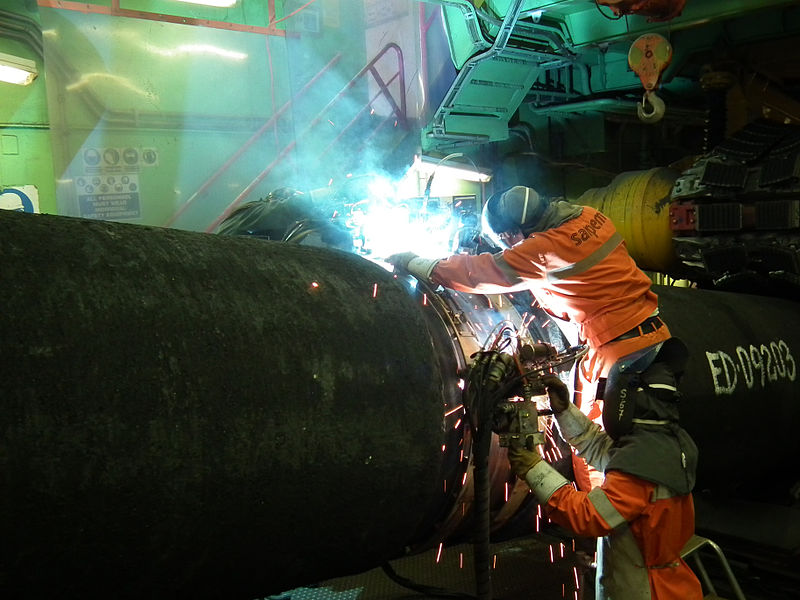
Image by Bair175
The litany of differences between Washington and Moscow seemingly grows every week as the two sides have arguably reached their worst bilateral relations since the days before the demise of the Soviet Union. These differences range from Russian meddling in the 2016 U.S. presidential election, Russian’s invasion in Ukraine in 2014 that prompted the U.S. to put in place crippling economic sanctions against Russia, as well as being on opposite sides in the prolonged civil war in Syria.
However, these differences also intersect the energy sector, a natural development since the U.S. is the now the world’s largest oil producer, with that output recently hitting a record breaking 11.1 million barrels per day (bpd), brushing aside Russia which until recently held the top oil producer spot for years. Saudi Arabia, for its part, remains the world’s top crude oil exporter. The U.S. is also, albeit slowly, making inroads into Russia’s decades old natural gas monopoly in Europe by striking liquefied natural gas (LNG) deals with EU members, particularly Poland and the Baltic states that have tried for years to move away from geopolitically charged Russian pipeline gas.
However, Washington has been less successful is trying to stop or even postpone the controversial Nordstream 2 gas pipeline - a 759 mile (1,222 km) natural gas pipeline running on the bed of the Baltic Sea from Russian gas fields to Germany, bypassing existing land routes over Ukraine, Poland and Belarus. It would double the existing Nord Stream pipeline’s current annual capacity of 55 billion cubic meters (bcm).
Germany capitulates under Trump pressure
However, it is one of the most geopolitically charged energy projects ever proposed. Germany maintains that the pipeline is needed to increase natural gas supply as some EU members move away from nuclear for power generation. But, not everyone agrees. The U.S., under the past three presidents including Donald Trump, has long countered that the pipeline puts European national security in jeopardy - a concern that seems grounded given Russia’s history of using gas a geopolitical weapon in the middle of winter.
The U.S. has complained so much, particularly to Germany, that several German companies have recently indicated that they would buy U.S. LNG imports and build the necessary infrastructure to import it, a move they perhaps disingenuously claim is more economic than geopolitical. At the end of the day any German LNG-pivot mostly aims to appease the Trump administration that has threatened sanctions against companies involved in the Nordstream 2 project.
Rehashing old grievances
Moscow is once again bringing it differences over the Nord Stream 2 pipeline with Washington to the forefront. Russian Foreign Minister Sergei Lavrov accused the U.S. on Friday of brazenly meddling in the gas pipeline project. “Interference in the process of forming the Nord Stream 2 project is simply brazen - for instance look at the regular public statements by the U.S. ambassador in Berlin that simply demand that the German government change its position and go against its own interests,” he told reporters.
However, it appears that the pipeline will be completed. German news agency DW reported in late January, citing one of the project’s engineers, that the Nord Stream 2 natural gas pipeline should be operational by November. Klaus Haussmann, an engineer at the pipeline project’s future landfall site at Lubmin on Germany's Baltic Sea coast, first told German public radio station Deutschlandfunk that the "raw" laying of the pipeline would be finished by the middle of 2019. "Then comes the entire installation of the electrical equipment, security chains. And, then it's planned on the large scale that we get the first conduit filled with gas in November, from Russia," he said.
Nord Stream 2 is owned by Russian energy giant Gazprom which already has a monopoly over Russia’s network of pipelines to Europe and supplies close to 40% of Europe’s gas. Meanwhile, Russia's gas exports to Europe continue to rise around 8% per annum, even amid concerns over Russia’s cyber espionage allegations, its close ties to Iran, its activities in Syria and Ukraine and its regional hegemony ambitions.



























The Russians are saying that the U.S. is brazen? Russia's revanchist invasions of its neighbors are brazen.